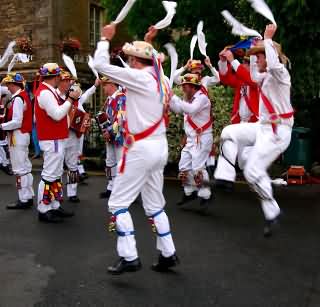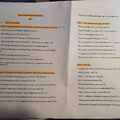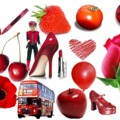http://iteslj.org/questions/christmas.html
http://iteslj.org/questions/christmas.html
On New Year's Eve, people traditionally take a shower in the fountains in Trafalgar Square! The Christmas tree is an annual gift from Norway.
http://iteslj.org/questions/newyearday.html
On 14th of February, St. Valentine's Day, many people send a card to the one they love or someone whom they have fallen in love with. People usually don't sign these cards and a lot of time is spent guessing who has sent them!
Ash Wednesday is the day in February when the Christian period of Lent begins. This refers to the time when Chris went into the desert and fasted for forty days. Although not many people actually give up eating during this period, on Pancake Tuesday, the day before Ash Wednesday, they eat lots of pancakes. These are made from flou, milk and eggs, and fried in a hot pan. Some towns also hold pancake races on that day. People run thhough the streets holding a frying pan and throwing the pancake in the air. Of course if they drop the pancake they lose the race.
At Easter time, the British celebrate the idea of new birth by giving each other chocolate Easter eggs which are opened and eaten on Easter Sunday. On Good Friday bakers sell hot cross buns, which are toasted and eaten with butter. Easter Monday is a holiday and many people travel to the seaside for the day or go and watch one of the many sporting events, such as football or horse-racing.
http://www.bbc.co.uk/apps/ifl/worldservice/quiznet/quizengine?ContentType=text/html;quiz=1458_easter
As summer comes, Britain likes to celebrate the end of the winter. Much of this celebration is connected with dancing, which is performed to encourage life and growth and to drive away harmful spirits. Children may be seen dancing round the Maypole on village greens, weaving their brightly coloured scarves into a beautiful pattern. Morris men dance all day long on 1st May, waving their white handkerchiefs to drive away the evil spirits and welcome in the new ones.
Halloween means “holy evening”, and takes place on October 31st. Although it is a much more important festival in the United States than Britain, it is celebrated by many people in the UK. It is particularly connected with witches and ghosts.
At parties people dress up in strange costumes and pretend they are witches. They cut horrible faces in pumpkins and other vegetables and put a candle inside, which shines through the eyes. People may play difficult games such as trying to eat an apple from a bucket of water without using their hands.
In recent years children dressed in white sheets knock on doors at Halloween and ask if you would like a “trick” or “treat”. If you give them something nice, a “treat”, they go away. However, if you don’t, they play a “trick” on you, such as making a lot of noise or spilling flour on your front doorstep!
Guy Fawkes Night
In 1605 King James I was on the throne. As a Protestant, he was very unpopular with Roman Catholics. Some of them planned to blow up the Houses of Parliament on 5th November of that year, when the King was going to open Parliament. Under the House of Lords they had stored thirty-six barrels of gun powder, which were to be exploded by a man called Guy Fawkes. However one of the plotters spoke about these plans and Fawkes was discovered, arrested and later hanged. Since that day the British traditionally celebrate 5th November by burning a dummy, made of straw and old clothes, on a bonfire, whilst at the same time letting off fireworks.
This dummy is called a 'guy' (like Guy Fawkes) and children can often be seen on the pavements before 5th November saying, 'Penny for the guy.' If they collect enough money they can buy some fireworks.
If you try to catch a train, a bus or an airplane on December 24th, you may have difficulty in finding a seat. This is the day when many people are traveling home to be with their families on Christmas Day, December 25th. For most British families, this is the most important festival of the year, it combines the Christian celebration of the birth of Christ with the traditional festivities of winter.
On Sunday before Christmas many churches hold a carol service where special hymns are sung. Sometimes carol-singers can be heard on the streets as they collect money for charity. Most families decorate their houses with brightly-colored paper, and they usually have a Christmas tree in the corner of the front room, glittering with colored lights and decorations.
There are a lot of traditions connected with Christmas, but perhaps the most important one is the giving of presents. Family members wrap up their gifts and leave them at the bottom of the Christmas tree to be found on Christmas morning. Small children believe that their gifts come from Santa Claus. Their parents tell them that Santa Claus lives in the North Pole and, on the night before Christmas, he travels the world in a sled pulled by reindeer. He goes down the chimneys of houses to leave gifts only for children who have been good. At some time on Christmas Day, the family will sit down to a big turkey dinner followed by desserts specially prepared for the occasion.
Later in the afternoon, they may watch the Queen on television as she delivers her traditional Christmas message to the United Kingdom. If they have room for even more food they may enjoy a piece of Christmas cake. December 26th is also a public holiday, and this is the time to visit friends and relatives or be a spectator at one of the many sporting events.
http://www.bbc.co.uk/apps/ifl/worldservice/quiznet/quizengine?ContentType=text/html;quiz=1120_christmas
Susan Sheerin, Jonathan Seath, Gillian White: Spotlight on Britain; Oxford University Press, 1985







